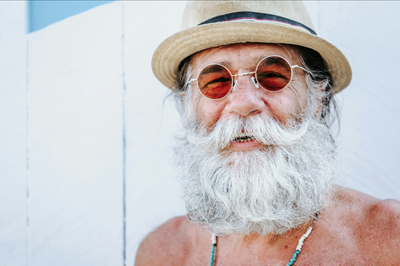Why Shame Loneliness?

Last night was a Saturday night.
Even my notion of Saturday night has long changed from, you know, the usual Saturday night. A Saturday night feels like another night for as long as I can remember, but sometimes the devil does come knocking on the door, “Hey, it’s a Saturday night, and you’re spending it alone?”
Oh, yes. What the heck, so what? Should I apologize?
But last night, I felt different.
While distributing our laundry to the closet, I was unaware of how empty the house felt until I heard Wallie’s footsteps toward the bedroom. His four paws with long nails scratched on the vinyl floorboards as he slowly approached me.
‘click-clack-click-clack,’ in a pin-drop silence of the evening. It suddenly warmed my heart on this cold night and made me realize how grateful I am for having him with me now instead of being alone.
The world feels like a much better place with him, and this thought flooded my brain with reminiscences of the silent days when I didn’t have him.
I wouldn’t change it for the world to have Wallie around like this.

While standing there, a ‘why’ question flashed into my mind.
I don’t see many people who can speak openly about their loneliness. People don’t just have a casual conversation over a coffee about this — including myself.
Why?
Even when there’s this famous claim everywhere over the internet about the study that found loneliness is as bad for your health as smoking 15 cigarettes per day (and I know a person who’s been living alone with no social connection whatsoever except on the phone screen, and smoke about a pack a day!), or that lonely people are more likely to suffer from heart disease, depression, and dementia. It also does more harm to the body than obesity, and it will increase your risk of death by 29% (not sure of what).
And yet, still, nobody wants to make it a topic of discussion.
I don’t usually do it myself; I still find it awkward and uncomfortable to address this feeling, even when I’m about a hundred percent positive about it.
I find that my feelings of loneliness intertwine with a sense of shame. I think the thought in my head last night was shaming me for spending Saturday night alone, like a lonely person who doesn’t have a life would do.
It’s somewhat ‘embarrassing’ to admit outright that we’re lonely. I cringe at the thought of telling people, “I do feel lonely sometimes.” It sounds better in my head as, “Don’t ever mention it.”
I spend most of my time alone. I’m quite comfortable this way, and it’s been working well for us (my husband works long hours, and we’ve been married for nine years, together for twelve). I’m one of those INFJs who need to retreat to solitude a lot to function, reflect, and recharge. But still, there are times I need to be connected with people I love, and myself.
To me, loneliness isn’t about being alone; it’s the feeling of disconnection to the environment around me or to myself.
This is why we find that the worst kind of loneliness is when we feel profoundly lonely, even when people or another person are around. This is the inner void, the emptiness inside. If we’re unable to acknowledge it, especially in this world that is filled with people who seemingly have it all, it could manifest into other worse things: eating disorders, addictions, depression, maybe inexplicable sadness, or even rage.
Humans have been a highly social species since the beginning of our time in caves. We cannot survive alone. This is why it’s a major pet peeve for me when I come across someone saying, “I’m the type of person that shouldn’t be with anyone,” or worse, “I’m better off not being in a relationship,” right when they just have a failed relationship.
No, you’re not better off alone; maybe you just haven’t found a meaningful relationship.
Or maybe you have an “avoidant” attachment style, or unaware of your flaws, or too lazy (or helpless) to work hard on yourself and your relationships, or maybe you are just a lousy liar.
There will be times when we need to be alone, and we should be able to. But the inevitable point I’m trying to make here is we can not survive- alone, not always, or all the time. And we shouldn’t be.
In the famous TED talk by Robert Waldinger (linked below*); a psychiatrist and a professor at Harvard Medical School, who is also the director of the Harvard Study of Adult Development- one of the longest-running studies of adult life in history, I found the reassurance to my intuition.
In this talk, titled “What Makes a Good Life? Lessons from the Longest Study on Happiness,” he discussed the findings of the study and shared insight on the factors that contribute to a happy and fulfilling life that emphasizes the importance of strong, supportive, meaningful relationship, and social connection.
Life In Denial
I first watched this talk in 2017 when I was living in Seoul, and in denial.
I didn’t agree with some parts of it, especially about how we need to have a healthy social connection. But that’s because my view on ‘social connection’ was inaccurate, distorted, and cynical.
After almost eight years of previously living abroad (in my twenties), I thought I graduated with a loneliness-proof degree and had developed high skills to go around it. I discounted the importance of social connection and buried it for good. Little did I know that it can creep up again from death and grow on without me realizing it.
I thought I wasn’t lonely. I got fooled by the story I made up in my head that I really liked being alone, which was true for most of the first two years when we moved to Seoul after twenty years of working and being in a world that never shuts up — I thought this was perfect.
But not long after, I — who was at the forefront of the anxious-avoidant type, with the help of the old habit pattern of the mind that resisted acknowledging any negative emotions — found myself weeping in the bathtub with a glass of wine, howling to the old hopeful songs from the nineties, drowning in melancholy- and didn’t know why.
“Why am I feeling so sad? I wanted this life!”
Beneath what we think we know about ourselves, there’s another completely different world. Our unconscious mind, our shadow.
Awareness Is the Key
Nowadays, loneliness is one of the emotions I pay close attention to. My main work is writing (alone, of course), and we’ve been in cities where we don’t speak the languages, and the number of people who can speak English is relatively low. I’m constantly on the edge of being too comfortable alone, and that can be dangerous if I’m not careful.
I am a true introvert who fuels my exhausted energy in solitude with my own company. It’s my nature and always has been my best friend. I still love it, but with the exception that I have to keep the scale balance and be able to acknowledge how I truly feel every day.
My task today is to empower the feeling of vulnerability and stay real to how I feel. I want to share my story to remind myself (and you, my dear reader friends) that we don’t have to have it all figured out all the time. We can admit to our negative emotions and flaws, and observe our feelings; this is very important to ward off shame.
And it’s perfectly normal if you feel lonely or sad and don’t want to talk to people about it. Although it will work magic to help if you do, it’s not easy even with the person you’re closest to in life. It requires enduring strength, a lot of practice, and unwavering courage to embrace your vulnerability.
You could begin by admitting to yourself- just you, quietly, no one else. Be aware of it, feel it, write about it, sleep on it- do whatever you need to acknowledge it. This is how you will undermine its power. The more you resist or deny, the more it will overpower you and feed on your soul.
Let’s not go there.
Stay here in the moment, and be brave. Stay true to your feelings, and be hopeful. Keep working on those relationships that are meaningful to you; even if they come off as a daunting, hopeless, tedious task, even if you feel it will fail you.
It’ll be worth the fall.
Thank you for spending time with me today.
*What Makes a Good Life? Lessons from the Longest Study on Happiness





